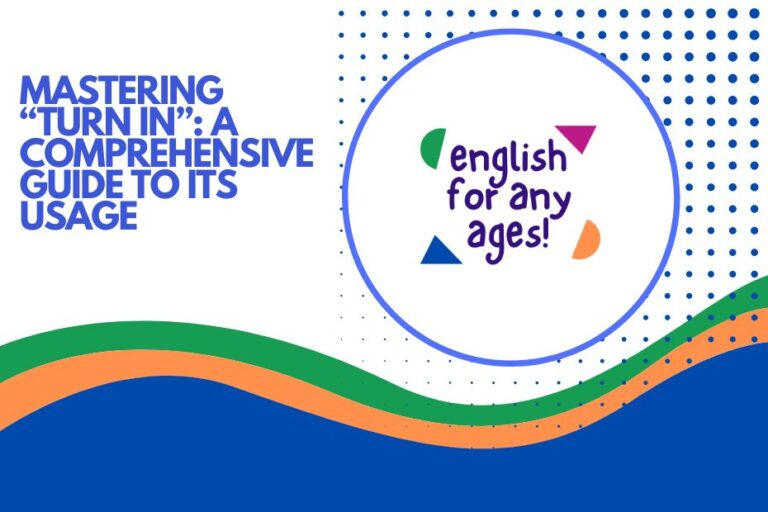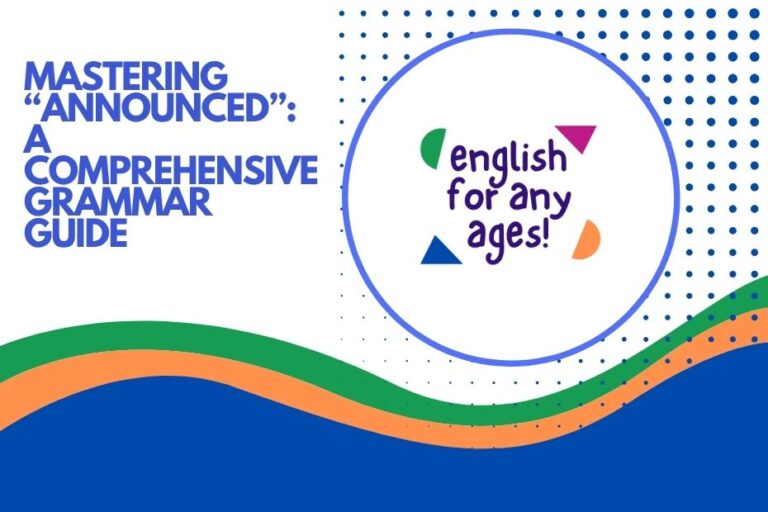Beyond Expectations: Other Ways to Say “Going the Extra Mile”
The phrase “going the extra mile” is a common idiom, but it’s just one way to describe exceeding expectations. Expanding your vocabulary with alternative expressions not only enriches your communication but also allows you to convey nuances in meaning.
This article explores a variety of phrases and expressions that capture the essence of exceeding expectations, enhancing your ability to express dedication, commitment, and exceptional effort. Whether you’re a student, a professional, or simply someone who enjoys language, this guide will help you diversify your vocabulary and communicate more effectively.
This article will benefit English language learners, professionals seeking to enhance their communication skills, and anyone interested in expanding their vocabulary to better express dedication and exceptional effort.
Table of Contents
- Introduction
- Definition: Going the Extra Mile
- Structural Breakdown
- Types and Categories
- Examples
- Usage Rules
- Common Mistakes
- Practice Exercises
- Advanced Topics
- FAQ
- Conclusion
Definition: Going the Extra Mile
“Going the extra mile” is an idiom that means to do more than what is expected or required. It signifies exceeding expectations, demonstrating exceptional effort, and showing a strong commitment to achieving a goal or providing excellent service.
It implies a willingness to put in additional time, energy, and resources beyond the standard requirements.
The phrase is often used in professional contexts to describe employees who consistently go above and beyond their job descriptions. It can also be used in personal relationships to describe acts of kindness and generosity that exceed normal expectations.
The core concept is about adding value and demonstrating a commitment to excellence.
Structural Breakdown
The idiom “going the extra mile” is a present participle phrase acting as a verb complement. It consists of the verb “going” (present participle of “to go”), the adjective “extra,” and the noun “mile.” The structure is relatively simple but carries a significant metaphorical weight.
The literal meaning refers to traveling an additional mile beyond what is necessary. Metaphorically, it represents expending additional effort, time, or resources to achieve a superior outcome.
The phrase emphasizes the voluntary nature of the extra effort – it’s not something that’s demanded but rather something that’s freely given.
Understanding the structure helps in recognizing similar phrases and expressions that convey the same idea. These expressions often involve verbs that indicate exceeding, surpassing, or going beyond standard requirements, followed by nouns or phrases that represent effort, dedication, or service.
Types and Categories
There are various ways to express the idea of “going the extra mile,” each with slightly different nuances. These can be categorized based on the aspect of exceeding expectations that they emphasize.
Effort-Based Expressions
These expressions focus on the additional effort and hard work invested. They emphasize the physical or mental exertion required to exceed expectations.
Dedication-Based Expressions
These expressions highlight the commitment and dedication involved in exceeding expectations. They emphasize the unwavering focus and resolve to achieve a goal.
Excellence-Based Expressions
These expressions emphasize the pursuit of excellence and the desire to deliver exceptional results. They highlight the commitment to quality and superior performance.
Service-Based Expressions
These expressions focus on providing outstanding service and exceeding customer expectations. They emphasize the commitment to customer satisfaction and going above and beyond to meet their needs.
Proactive-Based Expressions
These expressions highlight taking initiative and anticipating needs before being asked. They emphasize foresight and a willingness to take action to prevent problems or improve outcomes.
Examples
The following sections provide examples of phrases that convey the meaning of “going the extra mile,” categorized by the aspects they emphasize.
Effort-Based Examples
These examples focus on the additional physical or mental exertion involved.
The table below showcases various expressions that highlight the effort involved in exceeding expectations. Each expression is accompanied by example sentences demonstrating its usage in different contexts.
| Expression | Example Sentence |
|---|---|
| Burning the midnight oil | She was burning the midnight oil to finish the project on time. |
| Going above and beyond | The team went above and beyond to ensure the client was satisfied. |
| Putting in extra hours | He’s been putting in extra hours to meet the deadline. |
| Going all out | They went all out to make the event a success. |
| Pulling out all the stops | The company pulled out all the stops to win the contract. |
| Working tirelessly | She worked tirelessly to support her family. |
| Leaving no stone unturned | The detectives left no stone unturned in their investigation. |
| Sweating blood | He was sweating blood to get the presentation ready. |
| Giving it their all | The athletes gave it their all in the final race. |
| Exerting oneself | He exerted himself to complete the marathon. |
| Striving mightily | The organization is striving mightily to achieve its goals. |
| Putting one’s back into it | He really put his back into it to move the heavy furniture. |
| Going the distance | She went the distance to finish her degree while working full-time. |
| Digging deep | The team had to dig deep to win the championship. |
| Applying elbow grease | It took some elbow grease, but they finally got the engine running. |
| Going to great lengths | She went to great lengths to help her friend in need. |
| Pushing oneself | He pushed himself to the limit to achieve his fitness goals. |
| Going the whole nine yards | They went the whole nine yards to decorate the house for the holidays. |
| Going overboard | He went overboard with the decorations, but everyone loved it. |
| Making a Herculean effort | She made a Herculean effort to complete the project despite the challenges. |
| Knocking oneself out | He knocked himself out trying to please everyone at the party. |
| Burning the candle at both ends | She’s been burning the candle at both ends trying to balance work and family. |
| Plunging in headfirst | He plunged in headfirst to tackle the difficult task. |
| Getting one’s hands dirty | The manager wasn’t afraid to get his hands dirty and help the team. |
| Giving one’s best shot | She gave it her best shot, even though she knew the odds were against her. |
Dedication-Based Examples
These examples highlight the commitment and unwavering focus involved.
The following table provides expressions that underscore the dedication required for exceeding expectations. Each expression is illustrated with example sentences demonstrating its application in various contexts.
| Expression | Example Sentence |
|---|---|
| Being committed | She is committed to providing the best possible service. |
| Being dedicated | He is a dedicated employee who always puts the company first. |
| Sticking with it | Despite the challenges, they stuck with it and completed the project. |
| Seeing it through | She saw it through to the end, even when things got tough. |
| Staying the course | The team stayed the course and achieved their goals. |
| Remaining steadfast | He remained steadfast in his commitment to his principles. |
| Being unwavering | Her support was unwavering throughout the crisis. |
| Being resolute | He was resolute in his determination to succeed. |
| Being persistent | Her persistent efforts eventually paid off. |
| Being tenacious | He is a tenacious negotiator who never gives up. |
| Going to bat for someone | He went to bat for his colleague when she was unfairly criticized. |
| Standing by someone | She stood by her friend during a difficult time. |
| Supporting wholeheartedly | The community supported the project wholeheartedly. |
| Being a champion for | He is a champion for environmental causes. |
| Fighting tooth and nail | They fought tooth and nail to protect their rights. |
| Being a pillar of strength | She was a pillar of strength for her family after the loss. |
| Being a rock | He was a rock for his friends during the crisis. |
| Standing firm | She stood firm in her beliefs despite the opposition. |
| Being steadfast | His steadfast dedication to the cause was inspiring. |
| Being loyal | He was a loyal friend and colleague. |
| Backing someone up | He always backed up his team members when they needed help. |
| Having someone’s back | She always had her friend’s back. |
| Being there for someone | He was always there for his family and friends. |
| Showing solidarity | The workers showed solidarity by going on strike. |
| Pulling together | The community pulled together to help those affected by the disaster. |
Excellence-Based Examples
These examples highlight the pursuit of excellence and delivering exceptional results.
The table below presents expressions that emphasize the pursuit of excellence in exceeding expectations. Each expression is accompanied by example sentences, demonstrating its use in various situations.
| Expression | Example Sentence |
|---|---|
| Striving for excellence | The company is striving for excellence in all its products. |
| Aiming high | She is always aiming high and pushing herself to achieve more. |
| Raising the bar | The new product raised the bar for the entire industry. |
| Setting a new standard | The team set a new standard for customer service. |
| Exceeding expectations | The project exceeded expectations in terms of quality and timeliness. |
| Surpassing goals | The sales team surpassed their goals by a significant margin. |
| Outperforming others | The company outperformed others in the market due to its innovative products. |
| Delivering exceptional results | The consultant delivered exceptional results that exceeded the client’s expectations. |
| Going above par | The performance of the team was above par. |
| Knocking it out of the park | She knocked it out of the park with her presentation. |
| Hitting it out of the park | The team hit it out of the park with their new marketing campaign. |
| Going the distance | She went the distance to ensure the project was a success. |
| Climbing the ladder | He is climbing the ladder in his career through hard work and dedication. |
| Reaching for the stars | She is reaching for the stars and pursuing her dreams. |
| Going for gold | The athletes are going for gold in the Olympic Games. |
| Taking it to the next level | The company is taking it to the next level with its new technology. |
| Breaking new ground | The research team is breaking new ground in the field of medicine. |
| Pushing the envelope | The artists are pushing the envelope with their experimental art. |
| Raising the stakes | The company is raising the stakes in the competition. |
| Setting the pace | The new product is setting the pace for innovation in the industry. |
| Leading the way | The company is leading the way in sustainable practices. |
| Setting the standard | The restaurant set the standard for fine dining in the city. |
| Outshining others | Her performance outshined others in the competition. |
| Towering above the rest | His accomplishments towered above the rest. |
| Surpassing all expectations | The event surpassed all expectations in attendance and success. |
Service-Based Examples
These examples focus on providing outstanding service and exceeding customer expectations.
The following table offers expressions that highlight exceptional service in exceeding expectations. Each expression is paired with example sentences illustrating its use in various contexts.
| Expression | Example Sentence |
|---|---|
| Providing exceptional service | The hotel is known for providing exceptional service to its guests. |
| Going out of one’s way | She went out of her way to help the customer find what they needed. |
| Anticipating needs | The waiter anticipated our needs before we even asked. |
| Meeting and exceeding expectations | The company is committed to meeting and exceeding expectations. |
| Making customers happy | The goal is to make customers happy and build long-term relationships. |
| Going the extra yard | The salesperson went the extra yard to close the deal. |
| Taking care of customers | The company takes care of its customers by providing excellent support. |
| Going the second mile | He went the second mile to resolve the customer’s complaint. |
| Putting the customer first | The company puts the customer first in all its decisions. |
| Being attentive to detail | The staff is attentive to detail and ensures everything is perfect. |
| Doing everything possible | They did everything possible to accommodate our requests. |
| Going the extra step | She went the extra step to personalize the gift. |
| Giving white-glove service | The concierge provided white-glove service to the VIP guests. |
| Being customer-centric | The company is customer-centric and focuses on building strong relationships. |
| Providing a personal touch | The staff provided a personal touch that made us feel welcome. |
| Going above and beyond the call of duty | The nurse went above and beyond the call of duty to care for the patient. |
| Offering a helping hand | He always offers a helping hand to those in need. |
| Being accommodating | The hotel staff was accommodating and fulfilled all our requests. |
| Providing top-notch service | The restaurant is known for providing top-notch service. |
| Going out of one’s way to assist | She went out of her way to assist the elderly woman. |
| Making every effort | They made every effort to ensure our satisfaction. |
| Taking the initiative | He took the initiative to solve the problem before it escalated. |
| Walking the extra mile | The salesperson walked the extra mile to close the deal. |
| Showing exceptional care | The staff showed exceptional care in handling the situation. |
| Being proactive in addressing concerns | The company is proactive in addressing concerns and resolving issues. |
Proactive-Based Examples
These examples highlight taking initiative and anticipating needs before being asked.
The following table presents expressions that emphasize proactive behavior in exceeding expectations. Each expression is accompanied by example sentences, demonstrating its use in various situations.
| Expression | Example Sentence |
|---|---|
| Taking initiative | He took initiative to solve the problem before it escalated. |
| Being proactive | She is proactive in identifying and addressing potential issues. |
| Anticipating needs | The waiter anticipated our needs before we even asked. |
| Being forward-thinking | The company is forward-thinking and invests in innovative technologies. |
| Looking ahead | The manager is always looking ahead to anticipate future challenges. |
| Planning ahead | They planned ahead to avoid any potential problems. |
| Thinking outside the box | The team thought outside the box to come up with a creative solution. |
| Being resourceful | She is resourceful and always finds a way to get things done. |
| Taking the bull by the horns | He took the bull by the horns and tackled the difficult project. |
| Seizing the opportunity | She seized the opportunity to advance her career. |
| Being on the ball | The employee is always on the ball and ready to respond to any request. |
| Staying one step ahead | The company is staying one step ahead of the competition. |
| Being prepared | They were prepared for any eventuality. |
| Taking preventative measures | The company took preventative measures to avoid any potential risks. |
| Addressing issues proactively | They addressed issues proactively to prevent them from escalating. |
| Being vigilant | The security guard was vigilant in monitoring the premises. |
| Keeping an eye out | She kept an eye out for any potential problems. |
| Being attentive | The staff was attentive to our needs and responded promptly. |
| Taking ownership | He took ownership of the project and ensured its success. |
| Being accountable | She is accountable for her actions and takes responsibility for her mistakes. |
| Going above and beyond expectations | She consistently goes above and beyond expectations in her role. |
| Thinking ahead | He’s always thinking ahead to anticipate potential problems. |
| Taking preemptive action | The company took preemptive action to mitigate the risk. |
| Being proactive in problem-solving | She is proactive in problem-solving and always finds effective solutions. |
| Foreseeing potential challenges | He’s skilled at foreseeing potential challenges and planning accordingly. |
Usage Rules
When using these expressions, consider the context and the specific nuance you want to convey. While many of these phrases are interchangeable with “going the extra mile,” some are more appropriate in certain situations.
- Formality: Some expressions, like “burning the midnight oil,” are more informal than others, such as “exceeding expectations.”
- Specificity: Some phrases are more specific. For example, “providing white-glove service” is specifically related to customer service.
- Audience: Consider your audience when choosing an expression. Some idioms may not be understood by non-native speakers.
It’s also important to use these expressions appropriately. Overusing them can diminish their impact and make your communication sound insincere.
Use them selectively to highlight genuine instances of exceeding expectations.
Common Mistakes
One common mistake is using these expressions out of context or inappropriately. For example, saying “burning the midnight oil” when someone simply stayed a few minutes late at work would be an exaggeration.
Another mistake is using too many idioms in a short space of time. This can make your language sound unnatural and forced.
Here are some examples of common mistakes and their corrections:
| Incorrect | Correct | Explanation |
|---|---|---|
| He’s just doing his job, but he’s really burning the midnight oil. | He’s been putting in extra hours to ensure the project is completed on time. | “Burning the midnight oil” implies significant and sustained effort, which may not be accurate if he’s just doing his job. |
| She’s always going the extra mile, knocking it out of the park, and giving 110%. | She consistently exceeds expectations and delivers exceptional results. | Using too many idioms together can sound unnatural. |
| He’s just being dedicated. | He is a dedicated employee. | “Being dedicated” needs a noun or context to make sense. |
Practice Exercises
Test your understanding of these expressions with the following exercises.
Exercise 1: Fill in the Blanks
Complete the following sentences with an appropriate expression from the list below:
- going above and beyond
- burning the midnight oil
- taking initiative
- providing exceptional service
- sticking with it
| Question | Answer |
|---|---|
| 1. She is always ________ to ensure her customers are satisfied. | 1. providing exceptional service |
| 2. He’s been ________ to finish the report before the deadline. | 2. burning the midnight oil |
| 3. The team is ________ despite the challenges they are facing. | 3. sticking with it |
| 4. He is ________ by suggesting new ideas for the project. | 4. taking initiative |
| 5. The company is ________ to meet customer needs. | 5. going above and beyond |
| 6. Despite the setbacks, she was committed to ________ and achieving her goals. | 6. sticking with it |
| 7. The hotel prides itself on ________ to all its guests. | 7. providing exceptional service |
| 8. He’s ________ to ensure the project is completed on time. | 8. burning the midnight oil |
| 9. She ________ by proposing a new marketing strategy. | 9. taking initiative |
| 10. The volunteers are ________ to help the community. | 10. going above and beyond |
Exercise 2: Matching
Match the expression with its meaning.
| Expression | Meaning | Answer |
|---|---|---|
| 1. Pulling out all the stops | a. Exceeding expectations significantly | 1. b |
| 2. Going the whole nine yards | b. Doing everything possible to succeed | 2. c |
| 3. Knocking it out of the park | c. Going all the way to achieve something | 3. a |
| 4. Putting one’s back into it | d. Exerting a lot of effort | 4. d |
| 5. Climbing the ladder | e. Advancing in one’s career | 5. e |
| 6. Seizing the opportunity | f. Taking advantage of a favorable situation | 6. f |
| 7. Staying the course | g. Continuing with a plan despite difficulties | 7. g |
| 8. Offering a helping hand | h. Providing assistance to someone | 8. h |
| 9. Thinking outside the box | i. Approaching a problem creatively | 9. i |
| 10. Taking preventative measures | j. Acting to prevent problems from happening | 10. j |
Exercise 3: Sentence Completion
Choose the best expression to complete each sentence.
| Question | Options | Answer |
|---|---|---|
| 1. To win the championship, the team had to ________. | a) think outside the box, b) dig deep, c) offer a helping hand | 1. b |
| 2. The company is ________ by investing in new technologies. | a) staying the course, b) looking ahead, c) pulling out all the stops | 2. b |
| 3. She ________ to ensure her friend felt supported. | a) offered a helping hand, b) burned the midnight oil, c) went the whole nine yards | 3. a |
| 4. The project was challenging, but they were committed to ________. | a) climbing the ladder, b) staying the course, c) seizing the opportunity | 4. b |
| 5. To make the event a success, they ________. | a) took preventative measures, b) knocked it out of the park, c) went the whole nine yards | 5. c |
| 6. He ________ and found a creative solution to the problem. | a) thought outside the box, b) stayed the course, c) offered a helping hand | 6. a |
| 7. The government ________ to prevent the spread of the disease. | a) seized the opportunity, b) took preventative measures, c) dug deep | 7. b |
| 8. By working hard and improving her skills, she is ________. | a) staying the course, b) climbing the ladder, c) seizing the opportunity | 8. b |
| 9. When she saw the chance to start her own business, she ________. | a) dug deep, b) offered a helping hand, c) seized the opportunity | 9. c |
| 10. To move the heavy furniture, he really had to ________. | a) put his back into it, b) stay the course, c) take preventative measures | 10. a |
Advanced Topics
At an advanced level, understanding the cultural context and historical origins of these idioms can add depth to your understanding. Many idioms have historical roots that influence their meaning and usage.
Furthermore, exploring the use of these expressions in literature and other forms of media can provide a richer understanding of their nuances and impact. Analyzing how authors and speakers use these expressions can enhance your own communication skills.
Another advanced topic is understanding how these expressions translate into other languages. While some idioms have direct equivalents, others may require different expressions that convey a similar meaning but with a different cultural context.
FAQ
Here are some frequently asked questions about “going the extra mile” and related expressions.
- What is the origin of the phrase “going the extra mile”?
The phrase originates from the Bible, specifically Matthew 5:41, which says, “And whosoever shall compel thee to go a mile, go with him twain.” It encourages followers to do more than what is required of them.
- Is “going the extra mile” always a good thing?
While it’s generally positive, it’s important to ensure that you’re not overextending yourself or neglecting other responsibilities. It should be a voluntary act of generosity, not a mandatory expectation.
- How can I encourage my team to go the extra mile?
By creating a supportive and appreciative environment, recognizing and rewarding extra effort, and setting clear expectations while allowing for autonomy and creativity.
- What’s the difference between “going the extra mile” and “working hard”?
“Working hard” refers to putting in effort to meet the basic requirements of a job or task. “Going the extra mile” means exceeding those requirements and doing more than what is expected.
- Are there any negative connotations to “going the extra mile”?
Sometimes, it can be perceived negatively if it’s seen as trying to show off






